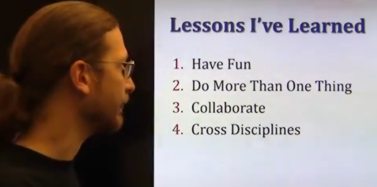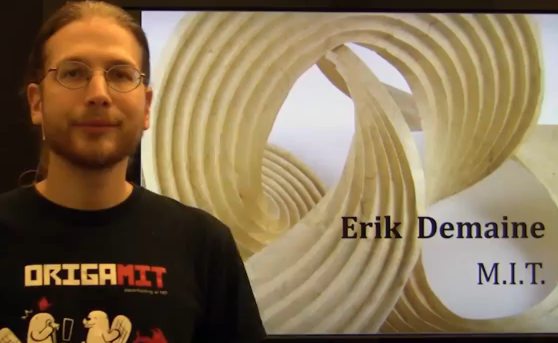| Erik Demaine On How To Do Research |
| Written by Alex Armstrong | |||
| Wednesday, 17 July 2013 | |||
|
Theoretical computer scientist Erik Demaine, who is also known for his love of puzzles and his origami sculptures, shares his approach to research in a video made for ICALP 2013. Erik Demaine is the 2013 recipient of the Presburger Award conferred annually by the European Association for Theoretical Computer Science to a young scientist for outstanding contributions in theoretical computer science. As he was unable to attend the recent award ceremony held during the 40th International Colloquium on Automata, Languages and Programming at the University of Latvia in Riga, he received the award via Skype and made a video as his presentation to the conference. In case you are not aware of the breadth of his interests, the citation for the Presburger Award 2013 reads: Erik Demaine, born in 1981, has made outstanding contributions in several fields of algorithms, namely computational geometry, data structures, graph algorithms and recreational algorithms. In computational geometry and data structures he has solved or made significant progress on classic problems such as the carpenter’s rule problem, the hinged-dissection problem, the prefix-sum problem, and the dynamic optimality conjecture. In graph algorithms he used the powerful theory of graph minors to develop a suite of algorithms for approximately solving a general family of intractable problems. He also started the new field of computational origami, where his book is the leading authority in the field. His work has shown promising applications to computer graphics, sensor networks, molecular biology, programmable matter, and manufacturing and engineering.
In the video Erik, who is currently a professor of computer science at MIT, starts by explaining how his interest in algorithms was sparked by puzzles and how home schooling, which he found both effective and flexible, taught him to collaborate with other people. He then proceeds to share four of the lessons he's learned that are key to his research:
His rationale for this is that working on more than one thing at once, which he describes as "time sharing the brain" is that it avoids getting stuck, and he advocates pipelining of papers as a parallel algorithm that allows you to be most productive with your time. Working on multiple projects can also produce surprising interactions and he goes on to discuss examples of connections between computational geometry and data structures. In the next section of the video Erik looks at collaboration which he strongly advocates; and in his final section on cross disciplines he considers how Math and Art can inspire each other. To illustrate this he shows a sculpture he made in collaboration with his father, Martin Demaine, an Artist in Residence at MIT who together with Erik was recently made a Guggenheim Fellow. He goes on to look at theorems in origami and origami robots - in which the words "fun" and "collaborate" crop up frequently. SourceMore InformationRelated ArticlesDemaines Become Guggenheim Fellows
To be informed about new articles on I Programmer, install the I Programmer Toolbar, subscribe to the RSS feed, follow us on, Twitter, Facebook, Google+ or Linkedin, or sign up for our weekly newsletter.
Comments
or email your comment to: comments@i-programmer.info
|
|||
| Last Updated ( Wednesday, 17 July 2013 ) |



